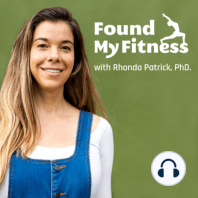10 min listen

#030 Roland Griffiths, Ph.D. on Psilocybin, Psychedelic Therapies & Mystical Experiences
FromFoundMyFitness
#030 Roland Griffiths, Ph.D. on Psilocybin, Psychedelic Therapies & Mystical Experiences
FromFoundMyFitness
ratings:
Length:
78 minutes
Released:
Jan 19, 2017
Format:
Podcast episode
Description
Dr. Roland R. Griffiths Dr. Roland R. Griffiths is a clinical pharmacologist at Johns Hopkins and has been researching mood-altering compounds for over 40 years. As an unusually prolific scientist, having published over 360-times, he's also responsible for having started the psilocybin research program at Johns Hopkins nearly 2 decades ago. In this podcast, you'll discover: 00:01:03 - the broader story of Dr. Griffiths 40 years of mood-altering drug research, including what got him started and how taking up a meditation practice ultimately influenced the eventual focuses of his research. 00:02:22 - the effect psilocybin has had in clinical trials in eliciting so-called mystical experiences that can act as a long-term catalyst for meaningful spiritual change and is amenable to being reproduced and clinically studied in a prospective manner. 00:03:45 - what distinguishes psilocybin from other drugs, particularly when reflecting backward on the experience months afterward. 00:05:11 - the process by which Dr. Griffiths and his team create an appropriate “setting” and facilitate feelings of safety for those participating in his trials. 00:06:42 - the elusive fundamental nature of a classical psychedelic experience whereby people often simultaneously describe the experience as ineffable (indescribable) but yet also often assign it a truth value that may even exceed that of everyday consensus reality. 00:07:36 - a description of the core features of a classical mystical experience that overlap with those found in a mystical experience induced by psilocybin. 00:08:58 - the qualities of the experience that Dr. Griffiths believes to most underlie the “reorganizational” potential it can have. 00:10:55 - the interesting potential areas for scientific exploration that the reproducibility of the psilocybin experience makes the substance amenable to. 00:11:25 - the promise psilocybin has shown as an effective therapeutic for anxiety and depression in patients with life-threatening cancer and also treatment-resistant depression in otherwise healthy patients (00:18:46). 00:13:04 - the lack of rigor in the very early trials on these compounds and the way in which cultural stigma surrounding psychedelic drugs ultimately played a role in impeding real, substantive clinical research for decades afterward. 00:16:31 - the long-term resilience of the antidepressant and anxiolytic effect, lasting six months and possibly even longer. 00:21:01 - the effect psilocybin has demonstrated in animal studies to increase hippocampal neurogenesis and enhance extinction of trace fear conditioning. 00:23:07 - the somewhat unintuitive neurobiological mechanism that may tie together some of the antidepressant properties of both psilocybin and ketamine, an anesthetic currently being studied as a rapid-onset antidepressant. 00:25:16 - whether or not the mystical subjective experiences are necessary for drugs like psilocybin to exert their antidepressant or anxiolytic effects. 00:26:43 - what the default mode network is and what its pattern of activity is in depression, long-term meditators, and after the acute use of psilocybin. 00:32:16 - the hard problem of consciousness. 00:37:26 - the challenge of finding the neurological correlates to match the phenomenology of individual’s subjective experiences. 00:38:16 - the promise psilocybin has shown in a small trial on smoking cessation where 60% of the treatment group were still abstinent a year afterward and plans Dr. Griffiths has to expand this area of research 00:41:10 - the possibility that the “reorganizational nature” of these experiences may open up new avenues as trials continue to try to embed the experience within different therapeutic contexts. 00:44:02 - the roadmap to FDA approval for use of psilocybin as a medication, particularly in the context of cancer-associated depression and anxiety. 00:45:05 - the risks inherent in taking psilocybin and the frequency of self-reported negative experiences in the ge
Released:
Jan 19, 2017
Format:
Podcast episode
Titles in the series (89)
#005 Dr. Bruce Ames Talks CHORI-Bar Weight Loss: Dr. Rhonda Patrick speaks with Dr. Bruce Ames, about a micronutrient- and fiber-dense nutrition bar (referred to as the CHORI bar) that was developed in the Ames laboratory. by FoundMyFitness